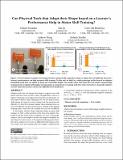| dc.contributor.author | Turakhia, Dishita G | |
| dc.contributor.author | Qi, Yini | |
| dc.contributor.author | Blumberg, Lotta-Gili | |
| dc.contributor.author | Wong, Andrew | |
| dc.contributor.author | Mueller, Stefanie | |
| dc.date.accessioned | 2022-07-18T14:05:38Z | |
| dc.date.available | 2022-07-18T14:05:38Z | |
| dc.date.issued | 2021 | |
| dc.identifier.uri | https://hdl.handle.net/1721.1/143801 | |
| dc.description.abstract | © 2021 Owner/Author. Adaptive tools that can change their shape to support users with motor tasks have been used in a variety of applications, such as to improve ergonomics and support muscle memory. In this paper, we investigate whether shape-adapting tools can also help in motor skill training. In contrast to static training tools that maintain task difficulty at a fixed level during training, shape-adapting tools can vary task difficulty and thus keep learners' training at the optimal challenge point, where the task is neither too easy, nor too difficult. To investigate whether shape adaptation helps in motor skill training, we built a study prototype in the form of an adaptive basketball stand that works in three conditions: (1) static, (2) manually adaptive, and (3) auto-adaptive. For the auto-adaptive condition, the tool adapts to train learners at the optimal challenge point where the task is neither too easy nor too difficult. Results from our two user studies show that training in the auto-adaptive condition leads to statistically significant learning gains when compared to the static (F1, 11 = 1.856, p < 0.05) and manually adaptive conditions (F1, 11 = 2.386, p < 0.05). | en_US |
| dc.language.iso | en | |
| dc.publisher | Association for Computing Machinery (ACM) | en_US |
| dc.relation.isversionof | 10.1145/3430524.3440636 | en_US |
| dc.rights | Creative Commons Attribution 4.0 International license | en_US |
| dc.rights.uri | https://creativecommons.org/licenses/by/4.0/ | en_US |
| dc.source | ACM | en_US |
| dc.title | Can Physical Tools that Adapt their Shape based on a Learner’s Performance Help in Motor Skill Training? | en_US |
| dc.type | Article | en_US |
| dc.identifier.citation | Turakhia, Dishita G, Qi, Yini, Blumberg, Lotta-Gili, Wong, Andrew and Mueller, Stefanie. 2021. "Can Physical Tools that Adapt their Shape based on a Learner’s Performance Help in Motor Skill Training?." TEI 2021 - Proceedings of the 15th International Conference on Tangible, Embedded, and Embodied Interaction. | |
| dc.contributor.department | Massachusetts Institute of Technology. Computer Science and Artificial Intelligence Laboratory | |
| dc.relation.journal | TEI 2021 - Proceedings of the 15th International Conference on Tangible, Embedded, and Embodied Interaction | en_US |
| dc.eprint.version | Final published version | en_US |
| dc.type.uri | http://purl.org/eprint/type/ConferencePaper | en_US |
| eprint.status | http://purl.org/eprint/status/NonPeerReviewed | en_US |
| dc.date.updated | 2022-07-18T14:01:35Z | |
| dspace.orderedauthors | Turakhia, DG; Qi, Y; Blumberg, L-G; Wong, A; Mueller, S | en_US |
| dspace.date.submission | 2022-07-18T14:01:37Z | |
| mit.license | PUBLISHER_CC | |
| mit.metadata.status | Authority Work and Publication Information Needed | en_US |
